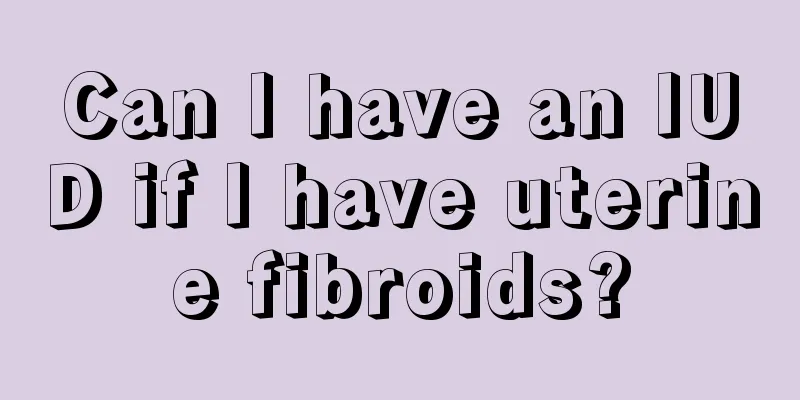Can I have an IUD if I have uterine fibroids?

|
The IUD is the most affordable and effective method among many contraceptive methods. Therefore, for women of childbearing age who want to prevent pregnancy, IUD insertion is generally recommended. Uterine fibroids are also a common disease among middle-aged women. So, if you have uterine fibroids and want to avoid pregnancy, can you have an IUD surgery? Usually, it is not recommended for women with uterine fibroids to have an IUD surgery, but other methods of contraception can be used. Can I have an IUD for uterine fibroids? Uterine fibroids can invade other organs in the uterine cavity and block the fallopian tubes, making it difficult for women to become pregnant. Even if they become pregnant in time, the possibility of spontaneous abortion is very high. Therefore, contraception becomes extremely important for patients with uterine fibroids. You cannot have an IUD inserted if you have uterine fibroids. Uterine fibroids, also known as uterine leiomyoma, are mostly asymptomatic. A few may present with vaginal bleeding, abdominal masses, and compression symptoms. It may cause pain if the pedicle is twisted or other conditions occur. Multiple uterine fibroids are common. Its typical symptoms are menorrhagia and secondary anemia, but some patients may have no symptoms. The symptoms of fibroids are generally closely related to the location and size of the fibroids. If an IUD is inserted in this situation, it will stimulate uterine fibroids, causing them to grow faster, and in rare cases, it may even develop into uterine cancer. Therefore, it is best to use condoms for contraception when you have uterine fibroids, and IUDs are not recommended. Side effects of female intrauterine device 1. Uterine perforation : The mechanism by which IUD insertion causes uterine perforation is not clear. It is generally believed that it may be caused by the inappropriate size of the uterus or improper operation by the doctor. In addition, when women exercise vigorously, the IUD in their body may cause damage to the uterus due to physical inertia. Unexplained uterine contractions may also squeeze the IUD and cause uterine perforation. 2. Damage to other organs : In rare cases, the intrauterine contraceptive device may cause uterine perforation and enter the abdominal cavity, thus causing the device to become dislocated. The IUD may be ectopically located in the bladder, pelvis, or mesentery. 3. Excessive menstrual flow : Some intrauterine contraceptive devices contain copper ions, which have cytotoxic and hemolytic effects, thus causing excessive menstrual flow. This is a normal phenomenon. 4. Ectopic pregnancy : If the embryo implants in the fallopian tube and does not reach the uterus, the result is an ectopic pregnancy. The contraceptive principle of the intrauterine device is to change the environment inside the uterus to cause miscarriage. It only works locally in the uterus, so it can only prevent normal pregnancy in the uterus, but cannot prevent ectopic pregnancy. 5. Endometrial fibrosis : Intrauterine contraceptive devices are essentially foreign bodies in the human body. It is common medical knowledge that foreign bodies in the human body can cause mechanical damage to local tissues, chronic inflammation, and fibrotic lesions. Ten to twelve years after the IUD is inserted, fibrosis will occur in the endometrium. 6. Pregnancy with an IUD : Pregnancy with an IUD is also called pregnancy with an implant. Since the contraceptive success rate of intrauterine devices is lower than that of oral contraceptives and sterilization, women should still take precautions after getting the device to prevent pregnancy while it is installed. 7. Soreness : Some women will experience soreness or discomfort in the lower abdomen or lower back after the IUD is placed. This is because the contraceptive ring placed in the uterus is a "foreign body" to the uterus. Especially when it is too large or positioned low, the uterus contracts to expel this "foreign body", causing uterine contraction pain. |
<<: Is there any way to relieve the stomach pain during menstruation?
>>: What medicine can eliminate uterine fibroids?
Recommend
What is better for pregnant women to eat?
"Getting angry" is an easy problem to s...
What tests should be done for ectopic pregnancy
Pregnancy is a particularly important event in a ...
Don’t let blood clots “block” you! Correctly understand blood clots and stay away from the “silent killer”
October 13, 2024 is the 11th "World Thrombos...
Causes of delayed menstrual period pain
I believe everyone knows the importance of menstr...
How to draw eyeliner
Eyes are the windows to the soul, and having a pa...
How to maintain breast health?
Breasts are very important organs for women and a...
What are the symptoms after IUD removal?
From a medical point of view, whether a woman has...
What to do if blood pressure is high at 36 weeks of pregnancy
There are many things to pay attention to during ...
What to do if your gums bleed during late pregnancy
When you are about to give birth, the most feared...
Vulvar papilloma diagram
Private papilloma is a tumor derived from epithel...
Does pregnancy affect sexual arousal?
In the early stages of pregnancy, you must mainta...
Why did my mother become shorter?
One day, I suddenly found that my mother, who use...
How do women maintain their uterus?
The uterus has a great impact on women's phys...
What to do if you take medicine during early pregnancy
Women in the early stages of pregnancy are genera...





![[Health Tips] Do you often have muscle soreness? Do you have these 6 little habits? Check yourself↓↓](/upload/images/67f10b888dda9.webp)



